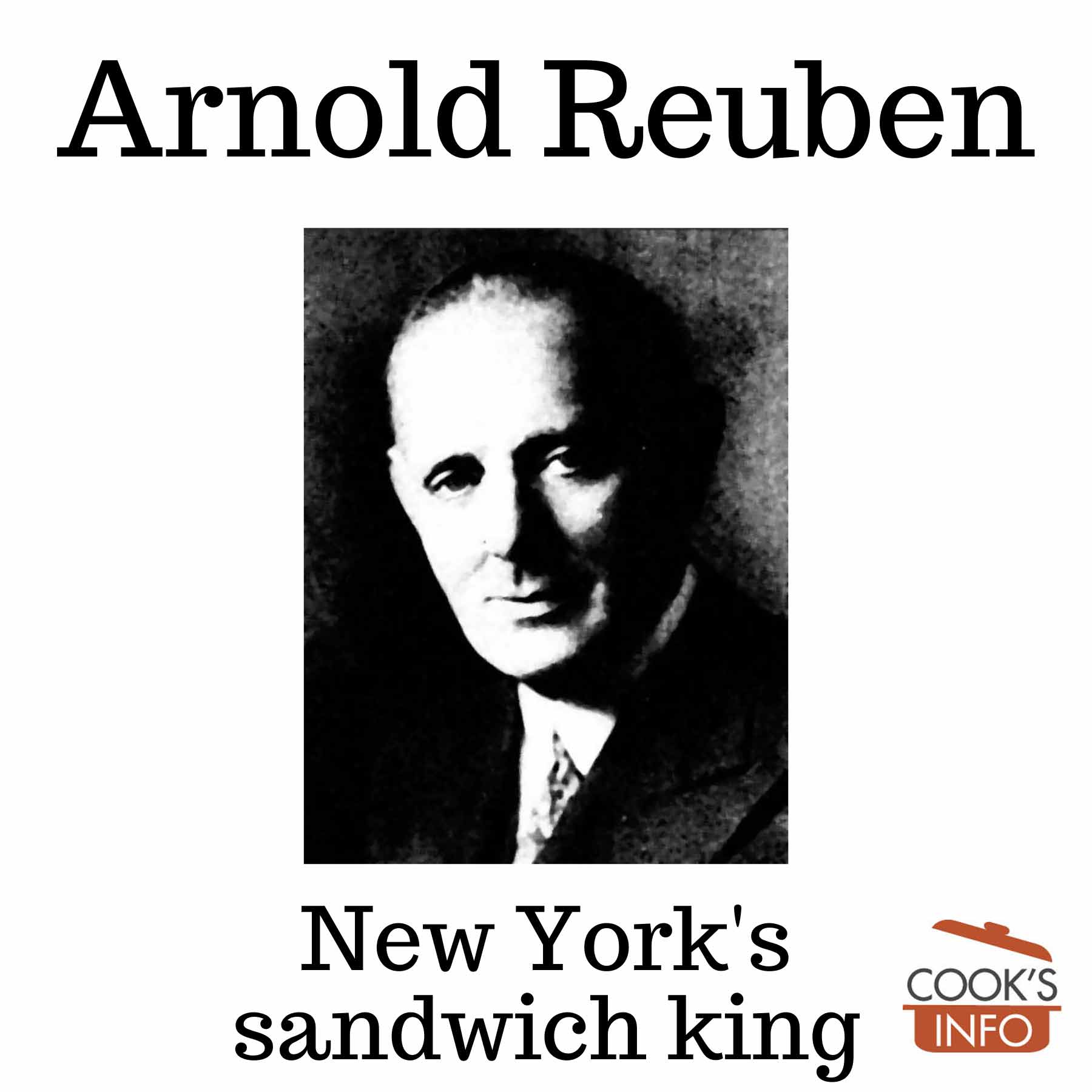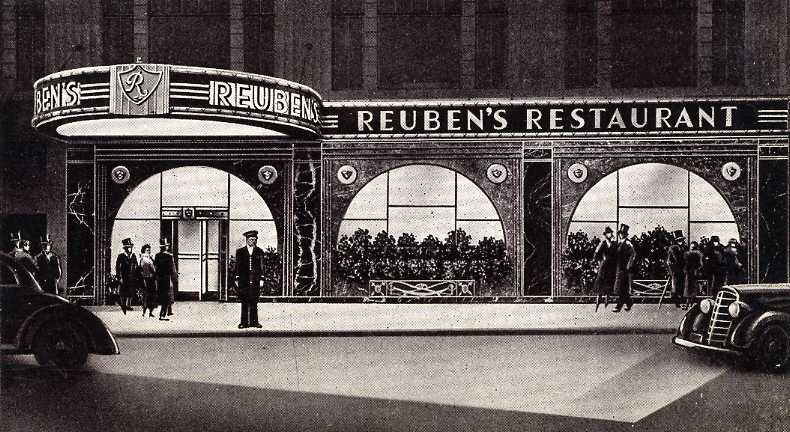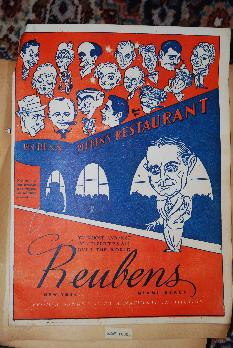
Arnold Reuben New York Sandwich King
Arnold Reuben (1883-1970) was born in Germany. Jewish to the core, he mixed Yiddish in with his English when speaking. His claim to fame was his sandwiches — many of the iconic American sandwiches were invented at his restaurants, and people still waxed poetic about the quality of the sandwiches long after the restaurants were gone.
He ran two famous New York restaurant: Reuben’s Restaurant and Delicatessen, and, The Turf. Reuben’s slogan was: “From a sandwich to an institution!”
In 1964, he sold his business to a Harry L. Gilman, and retired down to Palm Beach, Florida. He died 31 December 1970, aged 87.
Reuben’s son, Arnold Jr, worked for him from approximately 1930 until 1965 or 1966. Arnold Jr died 30 May 1997 in Seminole, Florida, aged 88.
He was probably not the inventor of the sandwich also called “Reuben”.
In the press of the time, he seems to have been often referred to as “Aaron Reuben”. [1]”The complaint charging oppression brought by Aaron Reuben, restaurant proprietor, against Police Inspector James S. Bolan, was dismissed yesterday…” — Reuben Charge Dropped. New York, NY: New York Tribune. Tuesday, 28 November 1922. Page 9, col. 5.
See also: Reuben Sandwich
Reuben’s Restaurant and Delicatessen

Reuben’s Restaurant at 6 58th Street. Jan Whitaker / wikimedia / Reuben’s Restaurant / CC BY-SA 4.0
Reuben opened his first New York restaurant in 1908 at 802 Park Avenue. He then moved it to Broadway and 82nd Street, and then in 1916 to Broadway and 73rd Street. In 1917, he also had a sandwich stand in Atlantic City. In 1918, he moved his restaurant to 622 Madison Avenue. It was here in 1919 that mobster and sports writer Arnold Rothstein met with others to conspire to fix the 1919 baseball World Series.
By September 1922, the restaurant was at 2,270 Broadway. There, the restaurant was implicated in having alcohol on the premises [Ed: note this was prohibition era]:
“The three patrolmen who have been on duty in alternate shifts at Reuben’s Restaurant, 2,270 Broadway, ever since a raid on the place by the police in search of liquors on Sept. 6, have been withdrawn, it was announced in West Side Court yesterday, when Inspector James S. Bolan appeared before Magistrate Earl Smith in answer to a summons procured against him by William J. Fallon, as counsel for Reuben. The hearing was adjourned to Oct, 7 at the request of Assistant Corporation Counsel of Walter B. Caughlin, who said that the Inspector’s two most important witnesses were away on vacation. Reuben claims that the flask of whisky found in his place had been “planted” there by one of the raiders.” — Butcher Shop Fire Reveals Two Stills. New York, NY: The New York Times. Wednesday, 27th September 1922. Page 21, col. 5.
In 1925, Reuben’s rented premises in Philadelphia to open a restaurant there:
“Heymann & Brother have rented the first floor and basement of the building at 213-15 South Broad Street to Reuben’s Restaurant of New York City. The premises adjoin the Ritz-Carlton hotel. Alternations will be made.” — Activities of Day in Real Estate. Philadelphia, Pennsylvania: The Philadelphia Inquirer. Wednesday, 9 December 1925. Page 18, col. 1.
In March 1926, the Broadway restaurant was robbed of $6,300 in a classic 1920’s style holdup:
“Reuben’s restaurant at 2,270 Broadway, near Eighty-second Street, was robbed early yesterday morning by four young men who felled two of the ten employees and escaped with $6,300 in a volley of pistol shots fired by a policeman who pursued the robbers car on the running board of a taxicab. The chase led east through Eighty-sixth Street to Fifth Avenue, but just after the sedan with the four men turned north into Fifth Avenue the pursuing car lost it in the mist.
There were no customers in the restaurant at 4:15 o’clock when four well-dressed young men entered. They sat near the door and one ordered a steak. Frank Seabadi, the cashier, was at the window of his cage and most of the other employees were eating breakfast at the rear. As a waiter advanced, two of the thieves walked toward the door and stood near the cashier, while the fourth walked half the length of the room. It was this man who started the action with the command to “stick ’em up:”
Hugo Fetthaus, a bus boy, bolted for the door. One robber felled him with his pistol. The man at the cashier’s window then moved quickly behind the counter. He reached for the $6,000 in the open safe. Seabadi attempted to guard the money and he, too, was knocked down. The thief at the safe took all the money and a $300 platinum watch and stuffed them into his pocket.
“Now if you guys try to follow us we will fill you full of lead,” was the final warning to those who stood with their hands above their heads…
[Seabadi and Fetthaus] were bandaged by their fellow workers. Neither required surgical attention.
A year ago, a lone robber raided Reuben’s and got away with $800.” — Four Rob Reuben’s, Escape Amid Shots. New York, New York: New York Times. Tuesday, 23 March 1926. Page 3, col. 1

Reuben’s restaurant ad 1929. Showing New York and Philadelphia locations.
In 1928, Reuben moved the restaurant to 6 58th Street, between Fifth Avenue and Madison Avenue. Reuben had his offices in the Squibb Building on Fifth Avenue, around the corner from the 58th Street restaurant. He lived at 8 East 58th Street by 1938.
Even though Reuben been in business at various locations for years, and at this one for seven years, he decided to have an official opening on 28 March 1935. It was attended by New York mayor Fiorello LaGuardia and written up in the New York Times.
The restaurant had dark red leather seats, dark walnut panelling, and gold-leaf on the ceiling. The decor featured stuffed fish (fishing was his hobby), and sail boats.
The sign for his restaurant just said “REUBENS.” It was in red neon, five feet high, twenty-five feet long. He had a revolving door with a doorman. As you came in, there was a sandwich counter at the entrance, and to the left there was a small, circular waist-high red, silver and black bar with a bartender. Over this bar he had the words “Friendship Is Life’s Most Wondrous Treasure” and “Gather Ye All Here Who Have Forsaken Gloom.” And the place was popular — even gangsters such as Arnold Rothstein hung out there.
The restaurant was open 24 hours a day. One of the cooks who worked for him in the early days was Alfred Scheuing. The food offered included duck with red cabbage, apple pancakes, chopped-liver, matzo-ball soup, borscht and chow mein. Reuben claimed that he developed and sold the first New York style cheesecake (using Break-stone’s brand cream cheese) while others were still using cottage cheese. His biggest claim to fame, though, was his sandwiches. His schtick became naming sandwiches after celebrities who were regular customers.

Reuben’s restaurant menu cover 1943. Sreejithk2000 / wikimedia / 2010.
Generations of New Yorkers would hang out there after theatre. Popular late night items were the cheesecake, and the 30 cm (12 inch) apple pancakes. They had someone in the kitchen who was specially trained in making the pancakes, in 30 cm (12 inch) cast-iron frying pans that were never washed.
Reuben’s stayed in this location until 1965 or 1966, then moved to 244 Madison Avenue, at the corner of Madison and East 38th Street. This iteration of Reuben’s became a meeting place for magicians. It was closed December 2001, by order of the New York City Department of Health citing “extensive insanitary conditions.” As business had gotten very slow, the owners at the time decided to just let it go.
Reuben’s Restaurant and Delicatessen was not related to the chain of restaurants out of Akron, Ohio now called Reuben’s Deli nor to Reuben’s Delicatessen in Montreal.
Turf Restaurant
Turf Restaurant opened in the Brill Building at West 49th and Broadway in 1942. The Brill building was the centre in New York for many songwriters, and business headquarters for music acts such as The Dorsey Brothers, Guy Lombardo and Duke Ellington. Reuben’s Turf Restaurant became a hangout for song-writers such as Barry Mann, Burt Bacharach, Carole King, Neil Sedaka, and Phil Spector. When the news hit the restaurant that Big Bopper (Jiles Perry Richardson), Richie Valens and Buddy Holly had just been killed in a plane crash, the restaurant emptied out as songwriters raced to their offices on the floors upstairs, all wanting to be the first to turn out a song about the tragedy.
Sidney Poitier washed dishes there for a short while in 1943.
Literature & Lore
In January 1923, there was a fight over prices at Reuben’s restaurant:
“REUBEN’S PRICES CAUSE BIG FIGHT: A bill for $3.75 for five sandwiches and a cup of coffee started a fight yesterday in Reuben’s restaurant, 2270 Broadway, which resulted in a broken nose for one guest, a scalp wound for another, and the arrest of Hyman Spiegel, a waiter. The latter was held in $500 bail for a hearing Wednesday, and a summons was issued for Aaron Reuben, the proprietor. The complainant is John J. Hickey, 248 East Fiftieth Street.” — New York, New York: Daily News. Sunday, 28 January 1923. Page 11, col. 1.
A subsequent report gives more details, and, confirms the restaurant’s address in 1923:
“Things didn’t go right for four men and two women who went to Reuben’s restaurant, 770 Broadway. First, the bus boy spilled water on one of the women. That put the six diners in a bad humor. And then the waiter brought the check. That put the six in a worse humor. It showed that $3.75 was owed for six sandwiches and a cup of coffee. John J. Hickey started out to get a policeman, according to his story told later in West Side court, to pass upon the $3.75 check. As he made for the door Herman Spiegel, a clerk at the restaurant, hit him on the jaw, the magistrate was told. In a general fight that followed two of Hickey’s companions, Elbert Norling and Robert Ross, received contusions of the head. Spiegel was held in $500 bail for examination. He is charged with assault. Hickey is the complainant. Norling told the magistrate that he had asked Patrolman Dixon to arrest Aaron [sic] Reuben, proprietor of the restaurant, but that Dixon refused. Reuben, according to Norling, struck him in the face. A summons was issued for Reuben to appear to answer a charge of assault.” — Six Sandwiches, $3.75; Then The Fight Began. Salisbury, North Carolina: Salisbury Evening Post. Page 1, col. 8
Both the famous and the infamous dined at Reuben’s, and Reuben’s was always in the national news because, with so many big names dining there, something newsworthy was always happening.
“Feeling in a mood today, this column will take you behind the scenes and show you how it is possible for a big story to be missed by the newspapers. And since I’m the little guy that missed it, I don’t suppose anyone but myself can be hurt by the exposé.
On Tuesday morning, Mr. Gene Tunney, Commander Byrd and another gentleman entered Reuben’s celebrated restaurant on Madison Ave. and 59th St. It was shortly before 5 o’clock. At another table sat a Mr. X, who is a very big gent in the boxing racket, Mr. X’s real name we cannot mention. Mr. X took one look at Tunney and then rose to his feet.
“Hello, you bum,” was his opening crack.
Tunney choked upon a glass of Reuben’s celebrated milk. Heavy-weight champions always drink milk. He nodded a bit vaguely. But Mr. X was not yet through. “Look here, Tunney!” he cried loudly. “You’ve ignored the boxing commission for the last time. I’m going to take a poke at you. And I don’t think you’ve got the guts to fight back. Come on outside.”
Reuben’s celebrated service was interrupted for the time being. Commander Byrd arose from the table and stole off into the silent night. He was wise. Reporters might have drifted in at any moment.
At any rate, Mr. X attempted to make good his threat. He paced back and forth in front of Tunney and threatened dire things. It took two bodyguards and ten of Reuben’s celebrated waiters to throw Mr. X out into the street. They finally tossed him into a cab on the flat of his back — which is no place for a gent so high in the boxing racket. Tunney left shortly after in one of Reuben’s celebrated taxicabs.” — Hellinger, Mark. Behind The News. New York, NY: The Daily News. Friday, 17 August 1928. Page 30, col. 1.
In 1947, Clementine Paddleford wrote about Reuben’s for Gourmet Magazine:
“Thirty-five years ago a young fellow named Arnold Reuben owned a modest little sandwich shop on upper Broadway. Possessed of an exuberant personality, Reuben began to snare in the famous ones of the stage for after-theater eating. Soon Reuben’s became the meeting place of the “greats” and “near-greats” of the amusement world. No everyday sandwich did young Reuben serve. His sandwiches had a touch, a look all their own.
“Move downtown,” his celebrity customers urged. “It’s unhandy coming up here just to get a quick bite.” Reuben moved to the fifties and promptly doubled, tripled, quadrupled his business. Now he opens his new million-dollar restaurant at 212 West 57th Street. This establishment is more than a restaurant, it’s a village of shops. Enter the lobby and look to your left—there’s the men’s grill, the cocktail lounge, and the bar. Ahead is the main dining room. But turn right to visit the flower shop to see the fruit baskets, the bakery, the delicacies. Theater tickets are sold, there’s a novelty counter if you want to pick up a small gift. Maybe you’d like a shave before dinner? There’s a barber shop on the premises, open all hours.
The food department is postwar as a radar range. Here are the finest of the canned and jarred delicacies of the food world….
Take a look behind the scenes. The kitchens are equipped with stainless steel walls, the most modern of stoves, the ultra in refrigeration. Kitchens number four, the cold kitchen, the hot kitchen, the dish-washing department, and a meat preparation center which is a regular meat shop in every detail. Preparation centers are set aside for vegetables, delicatessen foods, dairy products, meats, fish, baked stuffs, vegetables. Each kind of food has its own unit of refrigeration. ” — Paddleford, Clementine (1898 – 1967). Food Flashes Column. Gourmet Magazine. February 1947.
Sources
Batterberry, Michael and Ariane. On the Town in New York. New York: Routledge. 1999. Page 263.
Green, Adam. The Magic Basement (Reuben’s). New York: The New Yorker. 27 May 2002.
“Reuben And His Restaurant: The Lore Of A Sandwich”. Interview with Arthur Reuben, conducted by Arnold Manoff on 18 December 1938. American Life Histories: Manuscripts from the Federal Writers’ Project, 1936-1940. Retrieved 1 July 2006 from https://www.loc.gov/resource/wpalh2.22030607/?st=gallery. PDF form here: https://memory.loc.gov/mss/wpalh2/22/2203/22030607/22030607.pdf
References
| ↑1 | ”The complaint charging oppression brought by Aaron Reuben, restaurant proprietor, against Police Inspector James S. Bolan, was dismissed yesterday…” — Reuben Charge Dropped. New York, NY: New York Tribune. Tuesday, 28 November 1922. Page 9, col. 5. |
|---|

